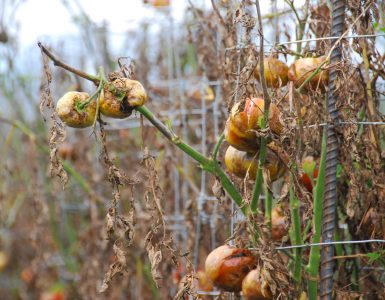This week our farm hosted a special training day for farmers. It was part of a monthly event organized by the Eastern Ontario CRAFT-the Collaborative Regional Alliance for Farmer Training-which is one of several similar programs in North America.
Farmers, interns, and workers from eight different area farms joined us for a day of tours and workshops. Emily (my partner) showed off the gardens and fields along with some of our techniques. Her brother Tim gave a workshop on rotational grazing methods, which we use to sustainably raise cows, sheep, and chickens. I followed up with a session on construction for the small farm.
It was a fun opportunity to get together for a potluck. It was also an important example of farmers training other farmers (and aspiring farmers).
Farmer training doesn’t happen by itself, and it’s not so easy to get these days. This spring it was announced that two campuses of the Ontario Agricultural College are being closed. Once Kempville campus and the French campus at Alfred (east of Ottawa) are shuttered, eastern Ontario will be left without an agricultural school. And the problem is about more than just diplomas. Colleges give advice and workshops, do research and answer questions. Without them, some farmers will fall back on advice from agrichemical companies. That is, from the very people who are trying to sell
them equipment, or pesticides and fertilizers, or genetically modified seeds.
This is rather like going to your doctor with an ailment, only to find that they have been replaced by a pharmaceutical sales rep; now the person who writes your prescription is the person who profits off the drugs. Far from an ideal situation, to say the least.
Furthermore, in Canada the average age of farmers-now over 55-continues to rise as the number of farmers diminishes. A dwindling number of (mostly aging) farmers means that crucial skills are at risk of being lost.
And there are a lot of skills involved in farming. It’s hard to overstate the diversity of knowledge required to be a good farmer. When I was much younger there was a commercial on TV in which I recall a narrator asking: “In what career do you have to be biologist? A chemist? A mechanic?” Each discipline was shown in series on the screen in simple white on black. The answer, of course, was the career of farmer.
A typical day around here might involve feeding animals and milking cows in the morning, welding a broken hinge and designing a building in the afternoon, and then weeding the garden and helping to deliver a calf before sunset. And then accounting, reading, research, or correspondence before bed.
Those are all traditional examples; a farmer today, selling directly to eaters, can add another list of skills. Shooting and editing a video to put online, or keeping in touch with eaters on social media, or tweaking the HTML on their website.
The great variety of work and skills involved can make farming an engaging, stimulating, and creative career. There are constant challenges and opportunities for learning.
I’ve spent much of the last ten years farming, and I still feel like a novice at some parts of it. My partner Emily, who runs the CSA and works far more than full-time as a farmer, is definitely more skilled. But she too is constantly learning new things.
All of this is why continued farmer training is so important. Even people who don’t want to go on to a career farming still enjoy workshops and internships. No matter what you want to do with your life, there are benefits from the problem solving skills involved, from learning to hone your abilities independently, and yes, cliché as it may sound, from the character-building that comes from taking on difficult tasks and succeeding.
For more information about CRAFT and internships, visit: www.craftontario.ca/regions/eastern-ontario/
Aric McBay is a farmer and author. He lives and works at a mixed family farm with a dairy herd and a vegetable operation.







